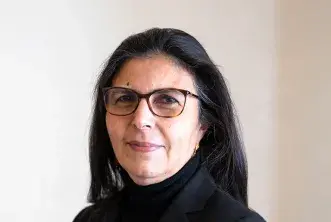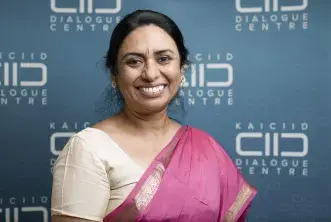World Economic Forum in Davos recognises the important role of Interreligious Dialogue and KAICIID

World Economic Forum in Davos recognizes the important role of Interreligious Dialogue and KAICIID
Representatives of the International Dialogue Centre (KAICIID) have been invited to speak at the World Economic Forum Annual Meeting in Davos, Switzerland, in recognition of the importance of interreligious dialogue and the increasingly significant role of religious leaders in shaping global cooperation and sustainable development today.
KAICIID Board Member Dr. Kezivino Aram and KAICIID Secretary General Faisal Bin Muaammar both will contribute to three panel discussions on the role of religious leaders and institutions in enhancing global cooperation and promoting interreligious dialogue. They will discuss current challenges that present a threat of conflict and division across key fault lines around the world, as well as across digital platforms fueled by disinformation.
Through their contributions, the KAICIID representatives aim to address the significant role of religious leaders and communities in supporting diplomatic efforts for peaceful coexistence, increased understanding, and common citizenship through enabling faith-actors, religious institutions, and policy makers from international organizations to work together towards sustainable and inclusive global cooperation that helps combat incitement to violence and extremism.
KAICIID’s participation at the World Economic Forum’s Annual Meeting in Davos 21-24 January 2019 is a strong signifier of the Centre’s leading role in the field of interreligious dialogue for global cooperation and world peace. Through its interreligious dialogue work and its international partnerships with academic and religious institutions as well as international organizations (including several UN bodies like UNDP, UNAOC, UNESCO, the UN Office for Genocide Prevention and the Responsibility to Protect) and NGOs, KAICIID aims not only to bridge communities and promote a culture that embraces diversity and pluralism, but it also aims to bring religious leaders and policy makers together to work through an inclusive process towards finding shared and sustainable solutions for common challenges.
About the World Economic Forum Annual Meeting
The World Economic Forum Annual Meeting is the only yearly gathering that brings together leaders of global society. The heads and members of more than 100 governments, top executives of the 1,000 foremost global companies, leaders of international organizations and relevant non-governmental organizations, the most prominent cultural, societal and thought leaders, and the disruptive voices of the Forum’s Young Global Leaders, Global Shapers and Technology Pioneers come together at the beginning of each year to define priorities and shape global, industry and regional agendas.
Participation is by invitation only and reserved for members of the Forum’s communities. The ongoing close collaboration with those communities in cooperation with a Network of Global Future Councils ensures the solution-oriented substance of the Annual Meeting. Numerous initiatives of global importance have been launched in Davos.
The World Economic Forum is an independent and impartial International Organization for Public-Private Cooperation. Its objective is to improve the state of the world. It does not promote any political, commercial or personal interests, nor does it use the names of its participants for promotional purposes.
The Annual Meeting aims to be open and inclusive. Transparency and public inclusion are achieved through broad international media participation, televised sessions and webcasts, and through the Forum’s millions of followers on social media. The Annual Meeting achieves the greatest media impact compared to any annual event outside the world of sport.
About KAICIID
KAICIID is an intergovernmental organization whose mandate is to promote the use of dialogue globally to prevent and resolve conflict to enhance understanding and cooperation. Over a seven-year-long negotiation and development process, KAICIID’s mandate and structure were designed to foster dialogue among people of different faiths and cultures that bridges animosities, reduces fear and instills mutual respect. Intercultural and interreligious dialogue helps build communities’ resistance against prejudice, strengthens social cohesion, supports conflict prevention and transformation and can serve to preserve peace.
As an international organization, KAICIID supports the Universal Declaration of Human Rights, in particular the right to freedom of thought, conscience and religion. The Centre also combats all forms of discrimination based on culture, religion or belief. We implement programmes to overcome stereotypes in a long-term process that leads to a culture of dialogue that enables greater understanding of people of other cultures and followers of other religions.
Our work is the continuation of a journey to fulfill a vision to bring together religious leaders and governmental representatives in a sustained dialogue for peace.


